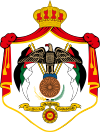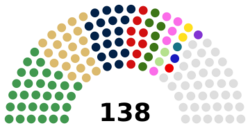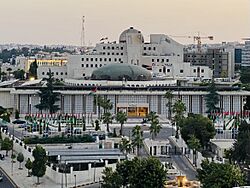Parliament of Jordan facts for kids
Quick facts for kids Jordanian Parliamentمجلس الأمة Majlis Al-Umma |
|
|---|---|
| 20th Parliament of Jordan | |
 |
|
| Type | |
| Type | |
| Houses | Senate House of Representatives |
|
Term limits
|
4 years |
| History | |
| Founded | January 1, 1952 |
| Leadership | |
|
President of the Senate
|
Faisal Al-Fayez, Independent
Since 7 November 2016 |
|
Speaker of the House of Representatives
|
Ahmed Safadi, Independent
Since November 15, 2022 |
| Structure | |
| Seats | 207 members: 69 senators 138 representatives |
 |
|
|
Senate political groups
|
|
 |
|
|
House of Representatives political groups
|
|
| Elections | |
| Appointed by the King | |
| Proportional representation, one third for political parties nationwide, and two-thirds for local lists (18 quotas reserved for women, 12 for Christians, 3 for Circassians and Chechens) | |
|
House of Representatives last election
|
10 September 2024 |
|
House of Representatives next election
|
2028 |
| Meeting place | |
 |
|
| Parliament building in Al-Abdali, Amman | |
The Parliament of Jordan is like the main law-making body in Jordan. It's called the Majlis Al-Umma in Arabic. It has two parts, or 'houses': the Senate and the House of Representatives. It was set up in 1952.
The Senate has 69 members. The King of Jordan chooses all of these members. The House of Representatives has 138 members who are elected by the people. Some seats are saved for specific groups: nine for Christians, three for Chechen and Circassian people, and fifteen for women. Members of both houses serve for four years.
Contents
Jordan's Parliament: A Look Back
Jordan is a country with a constitutional monarchy. This means it has a king, but also a government that follows a constitution and involves the people. Since Jordan became independent in 1946, its people have had some say in their government.
After the 1948 Arab-Israeli War, many Palestinian refugees came to Jordan. They were given Jordanian citizenship. These refugees made up a big part of Jordan's population.
Early Elections and Changes
Jordan's 1952 Constitution allowed people to form political parties. But in 1967, a state of emergency was declared. This meant that some rights were paused, and the Parliament stopped meeting until 1989.
In the Jordanian Parliament, the West Bank and East Bank regions each had 30 seats. The first elections were held on April 11, 1950. People in the West Bank could vote even before it officially became part of Jordan. The last time West Bank residents voted in Jordanian elections was in April 1967. Their representatives stayed in Parliament until 1988.
On July 30, 1988, King Hussein closed the lower house of Parliament. The next day, he announced that Jordan was cutting most ties with the West Bank. He said this was to help the Palestinian people create their own independent state.
Steps Towards More Freedom
After some public unrest in 1989, King Hussein decided to hold new elections. This was a big step towards giving Jordanians more freedom and democracy. Many people saw it as a hopeful sign for political change in the Arab world.
New laws were made to allow more freedom for the media and publishing. Political parties became legal again in 1992. In 1993, Jordan had its first multi-party elections since 1956. Today, Jordan is one of the more open countries in the Middle East for politics.
However, the King still has a lot of power. He chooses the members of the Senate and can replace the Prime Minister. For example, King Abdullah II of Jordan did this in April 2005.
In 2016, King Abdullah II dissolved Parliament. He then appointed Hani Al-Mulki as Prime Minister. In 2018, after large protests about a tax reform, Al-Mulki resigned. Omar Razzaz took his place.
How Laws Are Made in Jordan
Both the Senate and the House of Representatives can discuss and vote on new laws. Here's how it usually works:
- The Prime Minister sends ideas for new laws to the House of Representatives.
- The House of Representatives can accept, change, or reject these ideas.
- Each idea goes to a special committee in the House for review.
- If the committee approves, the government writes it as a bill.
- The House of Representatives votes on the bill. If they approve it, it goes to the Senate.
- The Senate debates and votes on the bill.
- If the Senate approves, the King can either agree to the law or refuse it.
- If the King refuses, the bill goes back to the House of Representatives. Both houses must then pass the bill again with a two-thirds majority vote for it to become a law, even if the King doesn't agree.
The King has a lot of power in this process. For example, between 2001 and 2003, when Parliament was not meeting, King Abdullah II passed 110 temporary laws on his own.
Who Can Be a Member of Parliament?
Senate Members
Senators serve for four years and can be chosen again by the King. To be a senator, a person must be at least 40 years old. They usually have held important jobs in the government or military before. Former prime ministers and members of the House of Representatives have become senators.
House of Representatives Members
Members of the House of Representatives are elected for four-year terms. To be a candidate, a person must be older than 35. They also cannot be related to the King or have financial deals with the government.
Political Parties in Jordan
Even with reforms, Jordan's political parties are still developing. In the 2016 election, most seats were won by independent candidates who were not part of a specific party. These candidates often had strong ties to local tribes or families close to the King.
The Islamic Action Front (IAF) is one of the most active political parties. There are 34 registered political parties in Jordan. However, many of them do not have a big impact on how the country is run.
In 2007, a new law said that all political parties needed at least 500 founding members from at least five different areas of Jordan. This made it harder for smaller parties to exist.
Research from Jordan University in 2007 showed that most people felt that political parties did not truly represent their hopes for the country. Many also believed that no party was ready to form a government.
Parliament's Committees
Both the Senate and the House of Representatives have special groups called committees. These committees focus on different areas, like legal matters, money, government rules, and foreign affairs. They can also create new committees when needed for specific tasks.
Challenges for Jordan's Parliament
Jordan's Parliament faces some challenges:
- Low Voter Turnout: Not enough people vote in elections. For example, in 2007, only 54% of voters participated. This shows that many people might not feel involved in the democratic process.
- Short Sessions: Parliament sessions are often short, usually from November to March. This can limit how much work they can get done.
- Lack of Party Involvement: Political parties have not played a very strong role. Many elected members run as independents, often based on family or tribal connections, rather than party ideas.
Jordan's Path to Democracy
Compared to older democracies in Western countries, Jordan's Parliament and its democracy are still quite new. However, Jordan has made good progress towards a democratic system when compared to other countries in the Middle East.
Some people argue that while Jordan has made big steps towards political freedom since 1989, the King still has the most power. A full transfer of power to elected officials has not yet happened.
See also
 In Spanish: Parlamento de Jordania para niños
In Spanish: Parlamento de Jordania para niños
- List of presidents of the Senate of Jordan
- List of speakers of the House of Representatives of Jordan
- 2024 Jordanian general election
- 2020 Jordanian general election
- 2016 Jordanian general election
- 2013 Jordanian general election
- 2010 Jordanian general election
- Politics of Jordan
- List of legislatures by country
 | Audre Lorde |
 | John Berry Meachum |
 | Ferdinand Lee Barnett |


